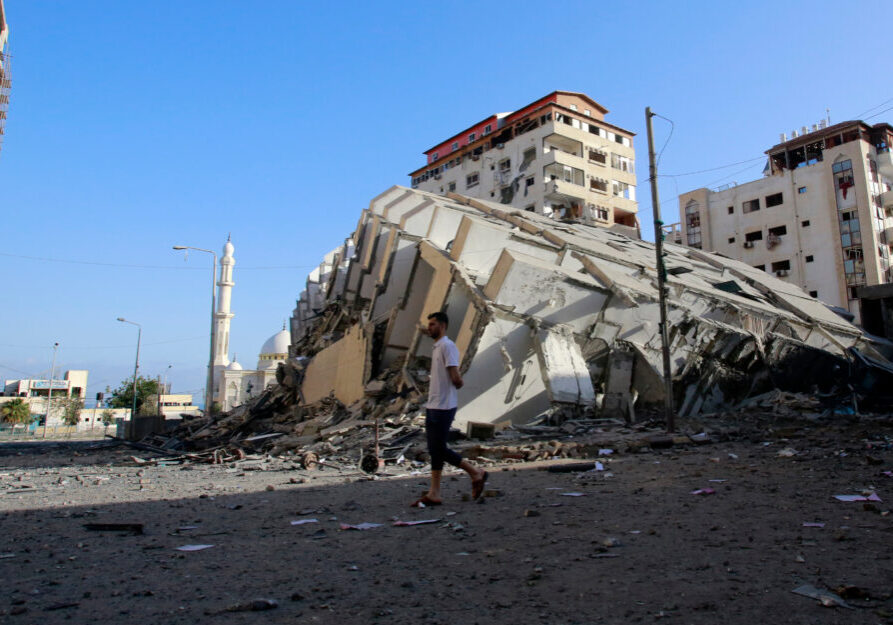Australia/Israel Review
Editorial: Egypt as Islamist Epicentre
Jul 2, 2012 | Colin Rubenstein
Colin Rubenstein
Just last month, Tareq al-Suwaidan, a leading Kuwaiti Muslim Brotherhood figure, was granted a visa to give lectures in Sydney and Melbourne, including at a forum on the campus of Monash University. It was his second visit to Australia.
Al-Suwaidan has a long history of espousing antisemitic statements, such as stating that “the most dangerous thing facing the Muslims is not the dictatorships. The absolutely most dangerous thing is the Jews. They are the most dangerous. They are the greatest enemy,” and “power lies with the politicians, who are influenced by two things and two things only: money and the media, both of which are controlled by the Jews.” He has also openly called for “armed resistance” against the “Zionist entity.”
While Suwaidan is adept enough to soften his rhetoric in his appearances before Australian audiences, his hateful teachings are accessible to all via the internet. One can only wonder how he has managed to secure a visa to visit Australia not once but twice.
Meanwhile, we know that people like Suwaidan can contribute to the radicalisation of a small but potentially lethal minority of Australian Muslims, as demonstrated in cases like the August 2009 plot to attack the Holsworthy army barracks by homegrown terrorists linked to the Somalia-based al-Shabaab.
Expect this problem to become worse, perhaps much worse, with the election of Muslim Brotherhood candidate Muhammad Morsi to Egypt’s presidency.
Established in Egypt in 1928 in the ashes of the Ottoman Caliphate, the Brotherhood is the fountainhead of almost all radical Sunni Islamist organisations, spawning many offshoots including Hamas and al-Qaeda.
The stage is now set for the Muslim Brotherhood to gradually fulfill its stated goals of transforming Egyptian society from within – while also potentially leading a bloc of Sunni Arab Islamist states – including potentially Tunisia, Syria, Libya, Yemen and Gaza – whose foreign policy will be anti-Western, rejectionist towards Israel, and pro-terrorist. Hamas – itself a branch of the Brotherhood – is jubilant over the election result, certain that it is now going to enjoy unprecedented backing for violent confrontation with Israel.
Notwithstanding the fact that the military remains, for now, the ultimate arbiter of power in Egypt, the Brotherhood is now negotiating from a position of strength within Egypt. It will also be able to extend its political influence abroad in a way never before possible, regardless of how much real power it possesses within Egypt in the short term.
Historically, Egypt has been for many years the intellectual centre of the Arab world. Its newspapers are the most widely read and influential. In the 1950s, pan-Arabism was born there, and emulated by most other Middle Eastern leaders. In 1979, it also became the first country in the Arab League to break the Israel taboo and make peace. Now, it can be expected to gradually become the epicentre of a highly influential and revamped version of the Islamist ideology that the Brotherhood first pioneered there in the 1920s.
Of course, Egypt’s Islamist surge merely conforms to a political trend in evidence across the entire Middle East over the last two decades, starting with the Algerian election in 1992, the triumph of Turkey’s AKP in 2002, Hamas’ Palestinian election victory in 2006 and the Tunisian and Moroccan polls of 2011.
It therefore becomes increasingly apparent how wide of the mark were those who predicted at the start of the Arab Spring that it meant Islamism’s demise as a political force was imminent.
The death in May 2011 of Osama bin Laden only furthered this doubtful analysis. But it is not simply the violent terrorist methods of groups like al-Qaeda that are the problem. At base, Islamism is a revolutionary totalitarian ideology, seeking to completely remake societies in such a way that individual freedoms, needs and rights become meaningless in the face of collective goals. It is just like Communism and Fascism in this respect – and, like them, also prone to see relationships with other societies in zero-sum terms.
It is worth remembering that the Brotherhood was and remains to this day modeled on the professional revolutionary parties of Europe – consisting of closed cells of dedicated cadres, with each member required to show complete loyalty to the central decision-makers, whose decision-making is done in the shadows. Moreover, in the ’30s and ’40s, it was a fascist ally, receiving both money and weapons from the Nazis.
While change is always possible for any ideological movement, there are very good reasons to be very cautious before sanguinely assuming that the Muslim Brotherhood will now operate as simply an Islamic equivalent to Europe’s Christian Democratic parties, as some seem determined to do.
Turkey, the model usually put forward as the basis for such hopeful scenarios, is actually much less exemplary than most of its advocates are willing to concede. If the increasingly onerous use by the AKP of the legal system to effectively intimidate or control the media, to jail or silence political opponents, and to enforce Islamic strictures across Turkish society continues much longer, Turkey will soon cease to be democratic in any meaningful sense, whether or not elections continue to be held. And Egypt lacks any of the recent democratic traditions Turkey possessed before the AKP took power.
Meanwhile, not only are the al-Suwaidans of this world now wielding power over the most populous and influential Arab state, they can be counted on to attempt to strongly use their position to export their ideology – not only to other Arab states, but also to Muslims around the world, including Australia. And that ideology has historically been the fount of almost all modern Islamist terrorism. In other words, Islamic radicalisation is likely to become turbocharged over coming years across the world and Australia cannot expect to remain immune. Governments and security agencies should recognise and upgrade their preparedness for the implications of this reality immediately.
Tags: Egypt






